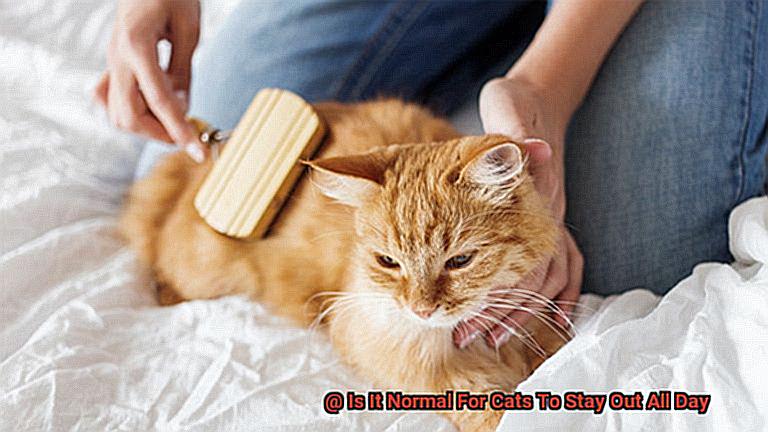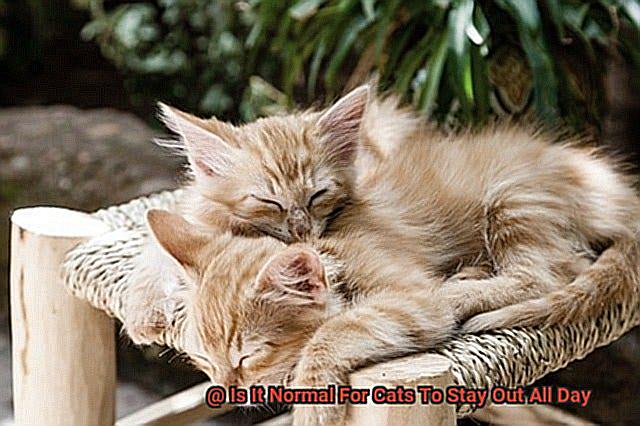Do you ever find yourself wondering if your cat’s daily outdoor adventures are normal?
As a fellow cat owner, I know the feeling. Our feline friends are known for their independent and curious nature, but is it safe for them to spend hours on end outside?
So, let’s delve into the topic and discover whether it’s normal for cats to stay out all day or if there are potential risks involved.
Is It Normal For Cats To Stay Out All Day?
Contents
You may wonder if it is normal for cats to stay out all day and whether their behavior reflects any underlying issues. As an expert on feline behavior, I am here to shed some light on this topic and provide you with a comprehensive understanding of your cat’s outdoor habits.
Nature vs. Nurture: Understanding Your Cat’s Natural Instincts
First and foremost, it is essential to recognize that cats are natural explorers and hunters. In the wild, they spend most of their day hunting for food and marking their territory. This behavior is instinctual and has been passed down through generations. Even though domesticated cats have a more comfortable life, they still possess these instincts, which often lead them to spend long hours outside.
Personality Plays a Significant Role
Just like humans, cats have individual personalities that influence their behavior. Some may be more adventurous and spend most of their time exploring outdoors, while others may prefer to cuddle up indoors with their owners. It is vital to understand your cat’s personality and recognize whether they prefer spending time outside or indoors. This knowledge will help you determine if it is normal for them to stay out all day.
Living Environment: Urban vs. Rural
The environment in which your cat lives also plays a significant role in their outdoor behavior. Cats who live in urban areas may not have as much freedom to roam outside compared to cats in rural areas. In urban settings, there are more potential dangers for cats such as traffic, predators, and other outdoor animals. In contrast, rural areas may offer more safe and open spaces for cats to explore without the risk of danger.
Health Check: Is Your Cat Fit for Outdoor Adventures?
Lastly, a cat’s overall health also plays a crucial role in how long they can stay out all day. A healthy and active cat is more likely to spend longer hours outside compared to a sick or older cat. As a responsible cat owner, it is essential to keep your cat’s health in check and ensure that they are capable of spending long periods outside if they choose to do so.
Factors That Influence a Cat’s Time Outdoors
As cat owners, we often wonder about our furry friend’s outdoor habits. Is it normal for cats to stay out all day? What influences their desire to spend time outdoors? In this post, we’ll explore the various factors that can affect a cat’s time spent outside, from their age and personality to their environment and daily routine.
Age
Just like humans, a cat’s age can greatly impact their behavior and habits. Kittens and senior cats are more likely to stay indoors as they are more vulnerable and may not have the same energy and curiosity as young adult cats. On the other hand, adult cats who are in their prime can spend most of their day exploring and hunting outside.
Personality
Cats, like people, have unique personalities. Some may be more adventurous and outgoing, while others may be more timid and prefer staying indoors. It is important for cat owners to understand their pet’s personality and provide an environment that caters to their needs. For example, if you have a shy cat, it is essential to create a safe and comfortable outdoor space for them to explore at their own pace.
Environment

The environment in which a cat lives can also greatly influence their outdoor behavior. Cats living in urban areas may have less access to safe outdoor spaces compared to those living in rural areas with large yards and fields. Therefore, it is normal for cats living in urban areas to spend more time indoors. Additionally, the safety of the outdoor space should also be considered. Cats living in areas with high traffic or predators may be limited in their time outdoors for their own safety.
Daily Routine
A cat’s daily routine can also impact their time spent outdoors. If a cat is fed at specific times during the day, they may be more likely to come back indoors after meal times. On the other hand, if a cat has access to food outdoors, they may choose to spend more time outside. Understanding your cat’s routine and providing them with a consistent schedule can help regulate their outdoor habits.
Territorial Behavior
Cats are territorial animals, and some may choose to spend most of their time patrolling and defending their territory outdoors. This is especially true for male cats who tend to have larger territories compared to female cats. If your cat is exhibiting territorial behavior, it is important to provide them with enough space and stimulation to satisfy their natural instincts.
The Role of Age and Breed in Outdoor Habits
They can be independent, curious, and even a little mischievous at times. So when it comes to their outdoor habits, it’s no surprise that age and breed can play a significant role. But as with any generalization, there are always exceptions. Let’s dive into the fascinating world of outdoor cat behavior and explore the different influences that may impact your cat’s love for the great outdoors.
Age: Young or Old, It Makes a Difference
It’s a common misconception that all cats love spending time outdoors. But just like humans, cats’ preferences can change as they age. Younger cats or kittens may show more curiosity and energy, leading them to spend more time outdoors exploring their surroundings. On the other hand, older cats may prefer to stay indoors, especially if they have any health issues or are less active. It is essential to consider your cat’s age when determining whether it is normal for them to stay out all day.
Breed: From Adventurous to Laid Back
Did you know that different cat breeds also have varying tendencies towards outdoor activities? Some breeds such as Siamese, Abyssinian, and Bengal are known to be more adventurous and enjoy exploring their surroundings. On the other hand, breeds like Persians or British Shorthairs tend to be more laid back and may not show as much interest in outdoor activities. Knowing your cat’s breed can give you some insight into their outdoor habits.
But Remember, Every Cat is Unique
While age and breed can play a role in a cat’s outdoor habits, it is essential to remember that every cat is unique. Factors such as past experiences, personality, and individual preferences can also influence a cat’s behavior towards spending time outdoors. Some older cats may still enjoy going outside for short periods, while some younger cats may prefer to stay indoors. It is essential to observe your cat’s behavior and adjust accordingly.
Environment: Where You Live Matters
Perception of Time for Cats vs Humans
Cats and humans have a lot of differences, and one of the most interesting ones is their perception of time. While humans are bound by the concept of time, cats seem to be living in a world without it. As a cat owner, you may have noticed how your feline friend seems to have a completely different understanding of time compared to you. But why is that? Let’s dive into the unique ways in which cats perceive time.
Different Brain Structure and Processing Ability
According to experts, cats have a short-term memory that lasts only about 16 hours, while humans can retain memories for a longer period. This means that cats do not hold on to past events as long as humans do, making them live in the present moment. This difference in memory retention and processing ability could contribute to their perception of time being different from humans.
Heightened Sense of Awareness
Cats are known for their exceptional senses, especially their keen sense of hearing and smell. This heightened awareness allows them to be fully present and engaged in whatever they are doing, whether it’s hunting, playing, or exploring. This could also contribute to their perception of time being different from humans, as they are more focused on their immediate surroundings.
Daily Routine and Activities
Another factor that affects a cat’s perception of time is their daily routine and activities. Cats are crepuscular animals, meaning they are most active during dawn and dusk. They spend a significant amount of time sleeping during the day and night, which could contribute to their perception of time being different from humans.
Independent Nature
Unlike dogs who rely on humans for their survival, cats are naturally independent creatures. They do not need a structured daily routine imposed by their human owners, so they may not feel the need to keep track of time like humans do. As long as they have access to food, water, shelter, and playtime, cats are perfectly content to stay out all day.
Time is Not Relevant to Cats
Lastly, it’s essential to remember that the concept of time may not be relevant to cats in the same way as it is to humans. Time is a man-made construct that helps us organize our daily lives and activities. For cats, survival is their main priority, and they don’t need time to dictate their actions.
The Importance of Environment for Outdoor Cats
Cats are natural-born explorers and hunters, making the great outdoors an enticing playground for them. As a cat owner, you may be wondering if it is okay to let your feline friend roam outside all day. While outdoor time can provide many benefits for cats, it is important to understand the potential risks and take necessary precautions to provide a safe and enriched environment for them.
Benefits of Outdoor Time for Cats
One of the main benefits of outdoor time for cats is the stimulation and exercise it provides. Cats need mental and physical stimulation to stay happy and healthy, and the outdoor environment offers endless opportunities for exploration, play, and hunting. This can help prevent behavior problems in cats such as aggression or destructive behavior due to boredom or pent-up energy.
Safety First: Creating a Safe Environment for Outdoor Cats
While outdoor time can provide numerous benefits for cats, their safety should always be the top priority. Providing a safe environment for them includes having access to fresh water, shelter or shade in extreme weather conditions, and safe hiding spots in case of danger or predators. It is important to regularly check on your outdoor cat’s health, including flea and tick prevention and vaccinations.
Location Matters: Choosing the Right Outdoor Space
The location of the outdoor area is also crucial in keeping cats safe. It is best to have a designated territory that is not near busy roads or other potential hazards. A fenced-in yard or a designated outdoor enclosure are good options for keeping cats safe while still allowing them to enjoy the outdoors.
Enrichment: Satisfying Natural Instincts
In addition to providing a safe environment, it is important to also enrich the outdoor space for cats. This includes providing appropriate toys and scratching posts to satisfy their natural instincts and prevent them from damaging furniture or plants.
Personal Insights: My Experience with Outdoor Cats
Growing up, my family had two outdoor cats that we allowed to roam freely throughout our large backyard. They spent their days exploring, napping in the sun, and occasionally bringing home a small trophy from their hunting adventures. While they enjoyed their outdoor time, we made sure to provide a safe and enriched environment for them, including regular vet check-ups and flea prevention. They lived long and happy lives, but I also understand the potential dangers that come with outdoor time for cats.
Tips for Keeping Your Cat Safe Outdoors
While cats are independent creatures who enjoy exploring their surroundings, it is essential to take precautions to ensure their safety. Here are ten tips to help you keep your cat safe and sound while they enjoy their outdoor adventures.
Microchip Your Cat:
Microchipping is a quick and easy procedure that can greatly increase the chances of being reunited with your cat if they get lost. It involves inserting a small chip under your cat’s skin, which contains identification information that can be scanned by a veterinarian or animal shelter.
Keep Up with Vaccinations:
Outdoor cats are more exposed to potential diseases and parasites, so it is crucial to keep up with their vaccinations and regular check-ups with the veterinarian. This will protect your cat’s health and prevent the spread of diseases to other animals.
Provide a Safe Shelter:
Cats need a safe place to retreat to when outdoors, especially during extreme weather conditions. This could be a cat house or a designated area in the garage or shed. Make sure it is comfortable and has access to food and water.
Use Flea and Tick Prevention:
Regular use of flea and tick prevention is crucial for outdoor cats. These pests can cause serious health problems for your cat if left untreated. Consult with your veterinarian to find the best preventive measures for your cat.
Supervise Outdoor Time:
It is important for cat owners to supervise their cats’ outdoor time, especially if they live in an area with busy roads or potential predators. This will ensure their safety and allow you to keep an eye on any potential risks.
Train Your Cat:
Training your cat to come when called can be helpful in case they wander too far from home. It is also useful in emergency situations where you need them to come back inside quickly. Positive reinforcement techniques can be used to train your cat effectively.
Consider a Cat Fence:
If you have a yard, installing a cat fence can provide a safe and enclosed space for your cat to explore while still being outdoors. It will also prevent them from wandering into potentially dangerous areas.
Provide Enrichment:
Outdoor cats can get bored easily, leading to destructive behaviors. Providing toys and other forms of enrichment can keep them mentally stimulated while outdoors. This will also help prevent them from straying too far from home.
Be Mindful of Your Neighbors:
It is important to respect your neighbors’ property and make sure your cat is not causing any damage or nuisance to them. This can also help maintain a good relationship with them and avoid potential conflicts.
Managing Your Cat’s Outdoor Time: Finding Balance
As cat owners, we want our furry friends to be happy and fulfilled, and it’s no secret that cats love spending time outdoors. After all, they are natural hunters and explorers. However, it’s also our responsibility to keep them safe from potential dangers. So how do we find a balance between our cat’s desire for outdoor time and their safety? As an expert in managing your cat’s outdoor activities, I have some valuable insights to share.
Setting Boundaries for Your Cat’s Outdoor Space
One of the best ways to manage your cat’s outdoor time is by creating a safe space for them to explore. This can include using a secure fence or enclosure, or even training your cat to walk on a leash. By setting boundaries, you can ensure that your cat stays within a designated area where you can supervise them and keep them safe from potential hazards.
Monitoring Your Cat’s Behavior and Surroundings
Just like us, cats can sometimes get themselves into trouble without even realizing it. That’s why it’s essential to monitor their behavior while they are outdoors. Keep an eye out for any potential dangers such as traffic, predators, or toxic plants in the environment. Cats are curious creatures, and it’s our job to make sure they don’t get themselves into harm’s way.
Consider Your Cat’s Individual Needs
Every cat is different, and their outdoor needs may vary. Some cats may be content with short periods of outdoor play, while others may need more time to roam and explore. It’s crucial to consider your cat’s individual personality and needs when determining how much outdoor time is appropriate for them. By understanding their specific needs, you can ensure that they are both happy and safe while spending time outdoors.
Keeping Up with Vaccinations and Identification
Outdoor activities can expose our cats to various risks such as diseases or getting lost. To protect them, make sure they are up-to-date on their vaccinations and have proper identification, such as a microchip or collar with tags. In case they wander too far from home, this will increase their chances of being reunited with you.
Conclusion
In conclusion, the question of whether it is normal for cats to stay out all day has no definitive answer. Each cat is unique and may have different preferences when it comes to spending time outdoors. However, as responsible pet owners, it is our duty to understand our feline friends’ natural instincts and provide a safe and enriched outdoor space for them.
It’s easy to understand why we may worry about our cats being outside for extended periods. After all, they are part of our family, and we want to keep them safe from harm. But it’s essential to remember that outdoor time is beneficial for our furry companions. It provides mental and physical stimulation, satisfies their natural instincts, and prevents behavior problems.
However, finding a balance between fun and safety is crucial in managing our cat’s outdoor time. We must set boundaries, monitor their behavior, consider their individual needs, and keep up with vaccinations and identification. By doing so, we can ensure that our cats are both happy and safe while enjoying their daily adventures outdoors.
In the end, whether your cat spends all day outside or prefers shorter outings, what matters most is that they are content and well-cared for. As loving pet owners, it’s up to us to provide a nurturing environment for our feline companions to thrive in both indoors and outdoors.






